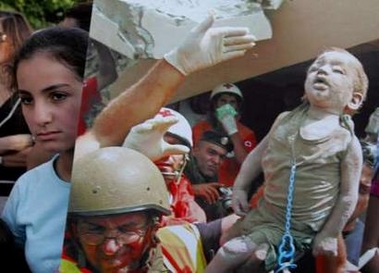UNITED NATIONS - Israel's shelling of the Lebanese village of Qana appears to
fit a pattern of violations of international law marking warfare between Israel
and Hizbollah guerrillas, U.N. Secretary-General Kofi Annan said on Monday.

A girl holds a poster
of child killed in the southern Lebanese town of Qana, during a protest in
Amman August 3, 2006, against the Israeli air strikes on Lebanon and Gaza
Strip. [Reuters] |
In a report to the U.N. Security Council, Annan said a comprehensive
investigation was needed to gather evidence of possible violations of
international humanitarian and human rights laws affecting both Lebanese and
Israeli civilians during the conflict.
The 15-nation council asked Annan to look into the deadly July 29 Israeli
bombing of a residential building in Qana to determine the facts of the raid,
which triggered outrage around the world.
Early Lebanese reports on the attack branded it a massacre, putting the death
toll at more than 54 people and at one point more than 60 people.
A Security Council statement adopted a day after the bombing expressed
"extreme shock and distress" at the shelling and called for a U.N. inquiry to be
completed within a week.
The Lebanese government later said it had found 28 corpses, some 14 of whom
were children, but it added the toll could still rise as recovery efforts had
been temporarily suspended.
Israel said in an August 3 letter to Annan that it regretted the civilian
casualties but "blames Hizbollah for manipulating and using innocent Lebanese
civilians as human shields."
The Lebanese government, however, told the U.N. chief that rescuers found no
weapons in the building and no evidence that any of the dead had been Hizbollah
militants.
Lebanese military authorities found "no indication that rockets were launched
next to the building," it said.
Annan said a week was inadequate to determine the facts.
"The attack should be seen in the broader context of what could be, based on
preliminary information available to the United Nations, including eyewitness
accounts, a pattern of violations of international law ... committed during the
course of the current hostilities," he said.
"The effects of the current conflict on civilians in Lebanon and Israel rise
to a level of seriousness that requires further gathering of information
including violations of international humanitarian law and international human
rights law," he said.
"Accordingly, I support the calls for a more comprehensive investigation," he
said.